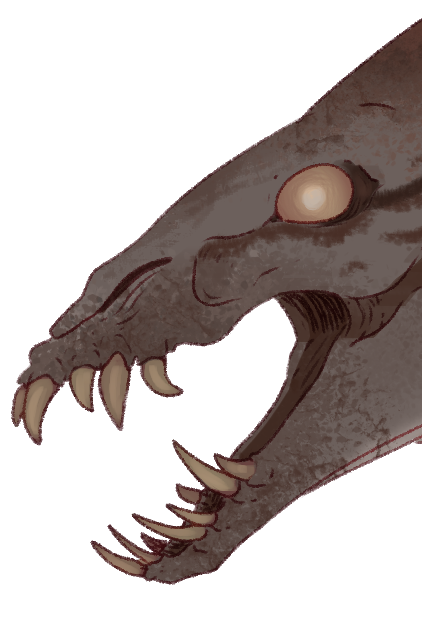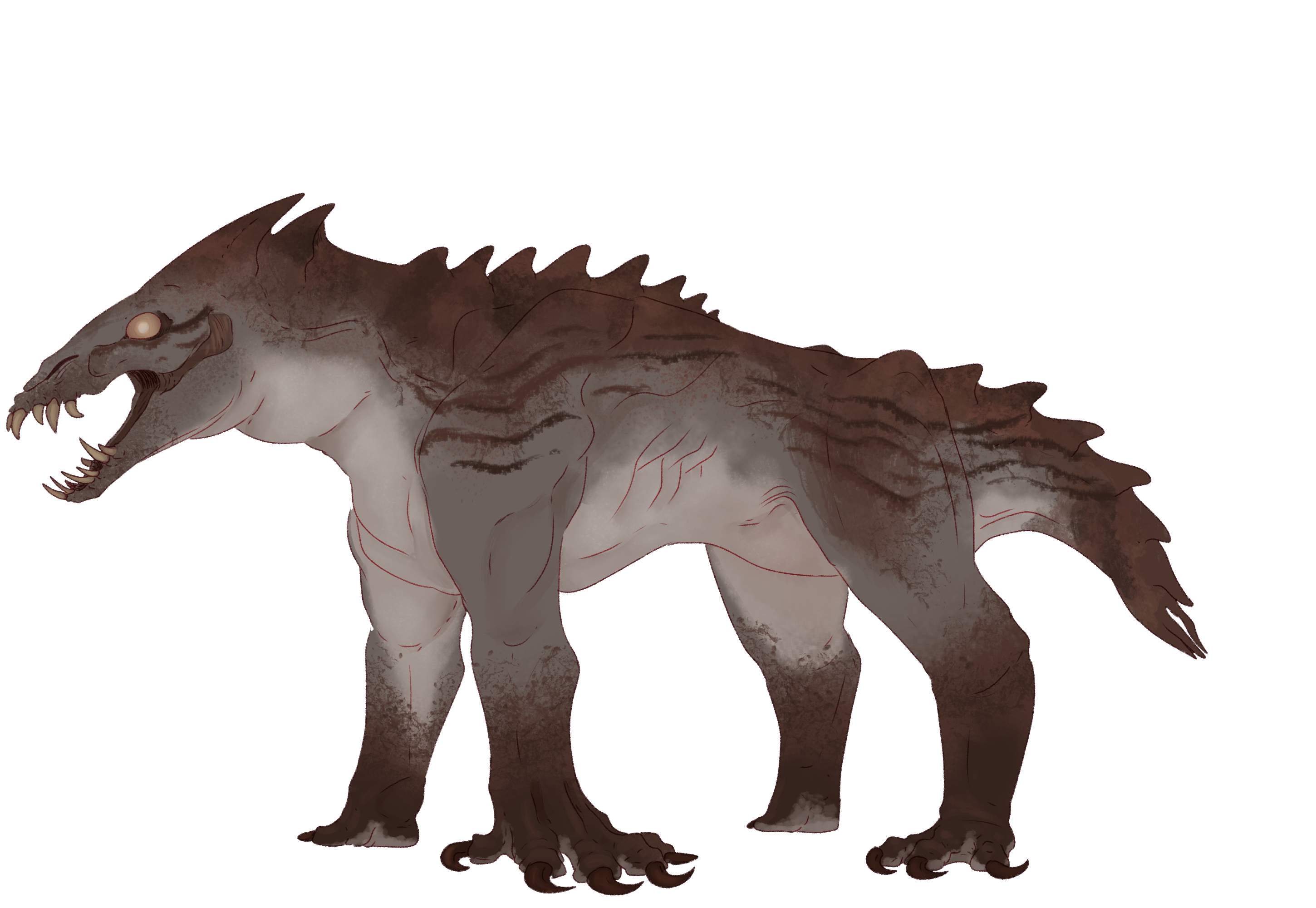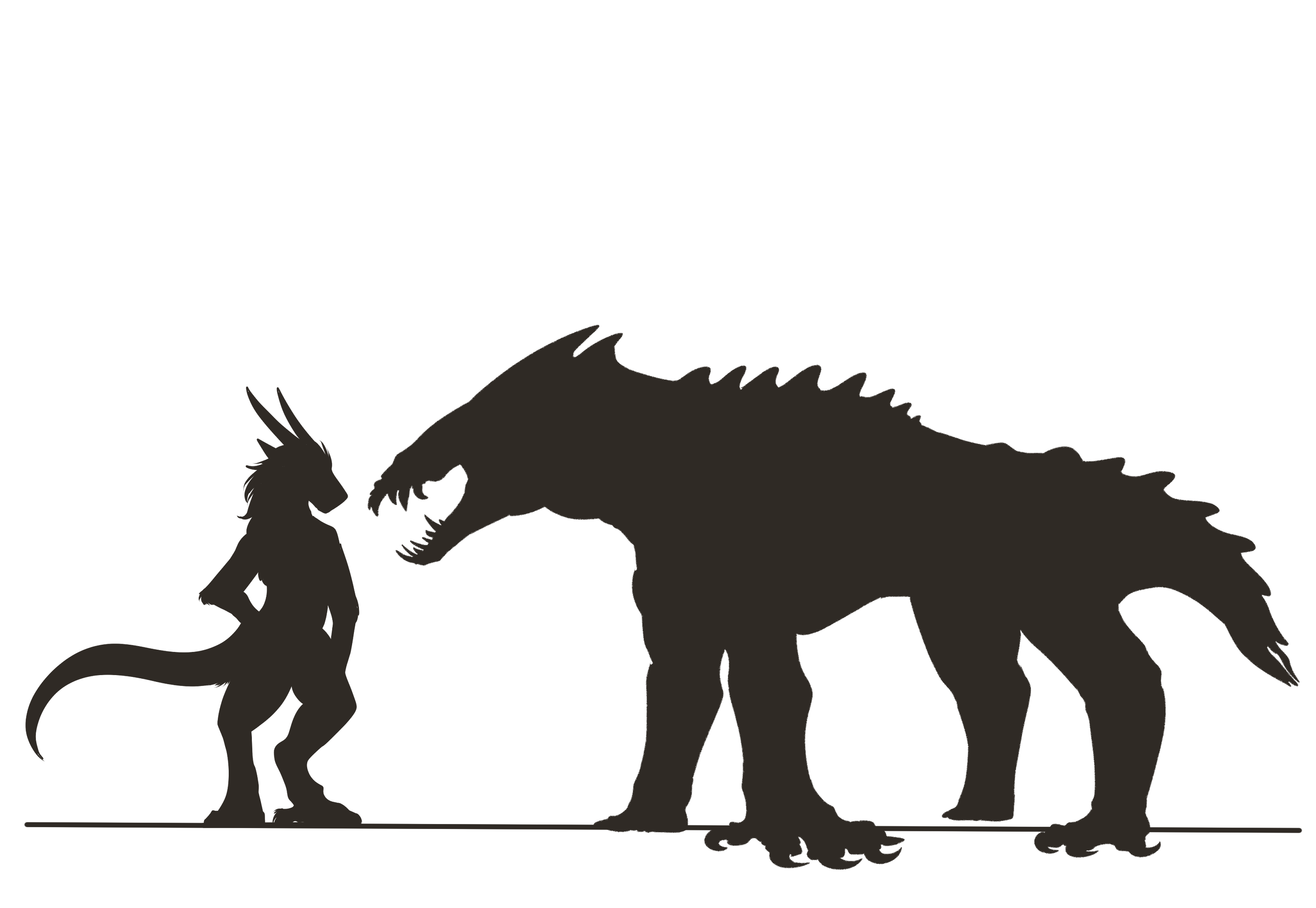
ID: F.AR.2.007
Name: C'thathrat
Sub Order: Of Corpse Of Feast! Liquid Rot Slough off Bone! Do you see it? Danger lurks Beneath the Fat of The Fallen.
Class: Pretaria
Sub Class: Rotterwail
Order: Carnfor
Group: Làrthbaj
Sub Group: Rot Herald
Height: 5-7ft
Weight: 800-900lbs
Length: 10-12ft
Related Species:
Calls:
Range
C'thathrat inhabit the upper regions of Arkhan, roaming along the outer line of the Congraven. Though on occasion they will wander downwards, inhabiting the colder valleys and ravines.
C'thathrat
Overview
C'thathrat fall into one of two categories. The animal itself and a Matriarch.
These medium sized predators are rather idle. Often just lounging due to their
unique lifestyles. Hard scaled backs act as armor from above while they swim through water.
Their claws have been very readily adapted to digging, curved this animal leaves a very
distinct track wherever it goes. Their teeth are uneven and sprawling as an adaptation
to feast upon rotting corpses.
High end contractors may attempt to tranquilize or kill a C'thathrat in an attempt to retrieve its bile.
The C'thathrat’s diet of rotting corpses and other scavenging bugs that burrow into the fetid meat
give this animal a unique byproduct that can be harvested. It is one of the only things known to
help combat the disease Writhelwrithe. As the introduction of new parasitic organisms
from the resilient C'thathrat can sometimes overcome those of Writhelwrithe.
Temperment
No. Horrible company, the C'thathrat’s needs cannot be met by any means in captivity. Any foolish individual who attempts to bring one back with soon find themselves rotting and decayed, chewed upon. C'thathrat are indifferent beasts, its unknown what level of awareness each possesses. Given the neural strands and matter they consume are to be exceedingly degraded by the time the animal gets to them.
Life Cycle
C'thathrat do not mate for life. They are indifferent to their kindred, say for breeding season. The young of a C'thathrat are laid in eggs. The hard shell is a brownish color withs red speckling, aiming to visually blend into the bog. Newly hatched C'thathrat are capable of fending for themselves, they grow fat on the bog. Til eventually moving off to start one of their own.
Matriarch C'thathrat and their Bogs.
Matriarch C'thathrat are those of the beasts who build and shape a large biome instead of a patch of mire to
call home. They start by digging a large hole and sealing it so it can catch water, as it rains, they
sit at the bottom and wait. Wait for something to take a drink, then kill it. The first kill is important as
it sets up the start of the Corpse Bog. C'thathrat typically try to slay larger prey, as it makes for a
better meal and bait. They eat half their kill to sustain themselves in preparation of waiting and allow
the other half to float to the surface as bait. And over time they kill more, and let more rot; and
attract quite the force of scavengers. More holes are dug and gradually as more water collects it starts
to form a bog, with quite the many corpses rotting. And eventually they attract their favorite guest in
their domain, Blackbranch Roctha .Who carry the seeds/propagations of Blackbranch trees
with them.
Soon their bog has new flora, since the corpse slush acts as such a rich fertilizer. The Blackbranch trees
are bare of leaves and are twisted and tangled, and more scavenger roctha come and roost. As
the waters and the corpses are baked under the suns. One could smell the corpse bog from miles away.
All while the Matriarch of the bog continues to tend to it. The bog acts as a high risk but so very
high reward area for other scavengers and carnivores. One bite from the Matriarch C'thathrat and you'll get a
wound so infected death will come swift to add you to the bog. But on the other hand: its a feast for the
ages. As long as the Matriarch C’thathrat doesn't bite you. If the bogs get large enough, they can sustain a
few C'thathrat but there will always be a reigning Matriarch. If the Matriarch C'thathrat dies and no other
steps up to its role, the place slowly but surely dies out.

